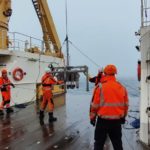The responsibility of Science Strategy Executive Group is to provide oversight and strategic direction for the BAS Science Directorate. In particular, to focus on issues that affect the long-term delivery of a world-class, sustainable science programme.
Specific responsibilities of SSEG are to:
- work collegiately to deliver solutions to strategic issues for the benefit of all BAS Science and the organisation as a whole;
- take responsibility to develop, implement, and maintain a science strategy that keeps BAS at the forefront of polar science, meeting the current NERC science strategy and delivering the BAS Vision;
- ensure the delivery of the BAS science programme, assessing progress, and ensuring excellent scientific outcomes;
- ensure that BAS leads and participates in scientific initiatives that lead to major advances in knowledge and expertise;
- foster a vibrant and fertile intellectual environment within BAS, in which all scientists are challenged to develop bold and exciting scientific ideas, and to develop their personal and professional skills;
- identify opportunities and ensure innovation, beneficial contact with stakeholders, and maximise the impact of BAS Science;
- identify and initiate opportunities to maintain and increase funding within BAS Science, and maintain a sustainable funding plan;
- agree any changes or adjustments required to ensure the sustainable funding and overall delivery of crucial science activities;
- monitor performance of BAS’s science portfolio, and ensure its scientists perform in line with the expectations of BAS and NERC, highlighting and praising excellence, and where required, implementing measures to improve performance;
- identify, and seek to overcome, impediments to scientific progress; reporting those that cannot be overcome to the BAS Executive.
Chair: Dr Anna Jones, Director of Science

Interim Director of Science

Science Leader - IMP 1

Science Leader IMP 2

Science Leader

Physiologist Adaptations Lea IMP 2

Director of Innovations and Impact

Head of Future Financial Strategy

Marine Ecologist and UKs CCAMLR Scientific Rep

IDP Science Leader IMP 3

Science Leader

Science Leader IMP 3

Environmental Data Scientist

Machine Learning Research Scientist

Science Leader
1 May, 2020
CAMBRIDGE: British Antarctic Survey (BAS) continues to plan its operational support to the UK and international polar research community during global challenges posed by COVID-19. Halley and Signy Research Stations …
12 September, 2018
The British Antarctic Survey has been awarded National Capability funds for polar science which will strengthen UK national security, resilience, economic growth and societal benefit
30 April, 2018
A new UK-U.S. Antarctic research programme to improve the prediction of future sea-level rise is launched this week (Monday 30 April 2018) at British Antarctic Survey (BAS), Cambridge. The £20 …
15 September, 2016
ODA funds – expertise to address major challenges facing the developing world
14 February, 2023 by
Huw Griffiths
The RRS Sir David Attenborough has begun its polar science trials in Antarctica. A team of 30 national and international scientists, engineers and technical staff are working on the ship …
3 August, 2020 by
David Vaughan
BLOG. BAS Director of Science, Professor David Vaughan describes his ambition for more diversity in science.








